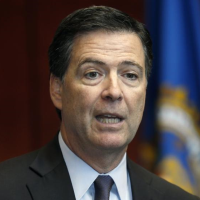Director Comey Admits FBI does Conduct Surveillance without a Warrant
 James Comey (photo: Mike Groll, AP)
James Comey (photo: Mike Groll, AP)
The Federal Bureau of Investigation’s (FBI) top official admitted this week that his agency sometimes bypasses the courts and pries into personal communications without a warrant.
Director James Comey’s admission was prompted after he first insisted that the FBI never, ever conducts electronic surveillance without a court order.
During an interview with the CBS program “60 Minutes,” Comey was asked if his agents ever probed emails and other communications without a judge first signing off.
“No,” Comey said. “We don't do electronic surveillance without a court order.”
He insisted “we cannot read your emails or listen to your calls without going to a federal judge, making a showing of probable cause that you are a terrorist, an agent of a foreign power, or a serious criminal of some sort, and get permission for a limited period of time to intercept those communications. It is an extremely burdensome process. And I like it that way.”
Within days of giving that interview, the director amended his statement during a talk at the Brookings Institution. He said: “It remains true in the over-, over- overwhelming number of our cases—we have court authority to collect the content of emails or telephones. But there are exceptions to the warrant requirement.”
National Journal’s Dustin Volz noted that Comey gave two examples of such exceptions: “When consent is obtained, and during surveillance of foreign suspects under Section 702 of the Foreign Intelligence Surveillance Act (pdf). That law allows for ‘incidental’ collection of Americans that electronically communicate with the foreign target, a practice that privacy advocates, including Sen. Ron Wyden, have slammed as a warrantless ‘backdoor search’ loophole that infringes on civil liberties.”
In his Brookings speech, Comey emphasized that electronic data shouldn’t be “beyond the law,” and he expressed caution about the heightened concern over privacy resulting from the “post-Snowden wind.”
He also criticized the new privacy measures instituted by tech companies, including the encryption capabilities of new cell phones made by Google and Apple which, he said, could prevent law enforcement from accessing data needed to thwart crimes and terrorism.
“Encryption threatens to lead us to a very, very dark place,” Comey told the National Journal. “No one in this country should be beyond the law.”
The American Civil Liberties Union (ACLU) begged to disagree. “Director Comey is wrong in asserting that law enforcement cannot do its job while respecting Americans’ privacy rights,” Laura W. Murphy, director of the ACLU’s Washington Legislative Office, said in a statement. “In fact, federal law explicitly protects the right of companies to add encryption with no backdoors. …Any effort by the FBI to weaken encryption leaves our highly personal information and our business information vulnerable to hacking by foreign governments and criminals. We applaud tech leaders like Apple and Google that are unwilling to weaken security for everyone to allow the government yet another tool in its already vast surveillance arsenal.”
-Noel Brinkerhoff, Danny Biederman
To Learn More:
FBI Director: Actually, We Do Sometimes Spy Without a Warrant (by Dustin Volz, National Journal)
ACLU Comment on FBI Director Comey’s Encryption Speech (American Civil Liberties Union)
The FBI Wants More Access to Your iPhone. Congress Is Standing in the Way. (by Brendan Sasso, National Journal)
FBI Wants More Authority to Spy Live on Gmail, Skype, Dropbox and Cloud (by Matt Bewig, AllGov)
FBI Uses Portable Device to Track Cell Phone Users (by Matt Bewig, AllGov)
FBI Accused of Violating Surveillance Laws 40,000 Times (by Noel Brinkerhoff and David Wallechinsky, AllGov)
- Top Stories
- Unusual News
- Where is the Money Going?
- Controversies
- U.S. and the World
- Appointments and Resignations
- Latest News
- Trump Renames National Football League National Trump League
- Trump to Stop Deportations If…
- Trump Denounces World Series
- What If China Invaded the United States?
- Donald Trump Has a Mental Health Problem and It Has a Name






Comments